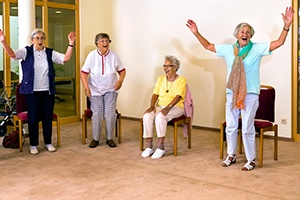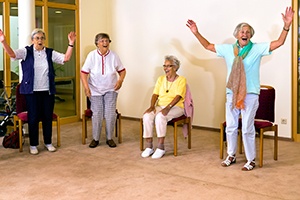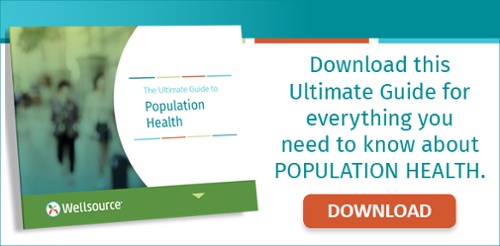Wake up early. Have some cereal and coffee. Pack along some fruit and head out the door. That’s the typical morning schedule for Pennsylvania resident Marjorie Coblentz.1 Once she’s out the door, her schedule is booked with regular exercise, a part-time job at a gift shop, time with family, and activities with friends.
“Two afternoons a week I play bridge,” says Coblentz. “Two nights a week I play pinochle. Sometimes there’s live entertainment or movie night, and then there’s the fun and sometimes competitive Nintendo Wii bowling league.”
Coblentz isn’t one to spend her free time sitting around. But she could if she wanted to. She’s 92 years old and has almost a century of memories to look back on. She raised a family. She enjoyed a long and fulfilling career as a math teacher. She’s traveled to a long list of destinations around the world. And she enjoys living her best life every day.
“I used to think, ‘I wonder how much longer this is going to go on,’” says Coblentz. “I remember hoping that I would live to see the year 2000. It’s hard to believe I’ve already lived 16 years beyond that. And I’m not objecting.”
Blue Zone Habits for Aging Well
Coblentz is among a growing population of seniors who are living well beyond the average life expectancy of 78.8 years in the United States, according to the Centers for Disease Control and Prevention.2 She’s even survived a stroke and cancer. So why is she still around?
Her habits look a lot like people living in the Blue Zones, first identified in Italy by researchers Gianni Pes and Michel Poulain.3 Then National Geographic writer Dan Buettner set out to try and understand why some people around the world live to be over 100 years old. The project identified regions around the world with a concentration of centenarians (Sardinia, Italy; Okinawa, Japan; Loma Linda, Calif.; Nicoya Peninsula, Costa Rica; Icaria, Greece; Skåne, Sweden).
Then a pattern of nine lifestyle habits began to emerge.4 And surprisingly, the lifestyle habits of the world’s centenarians look a lot like the everyday habits Coblentz follows today. If you want to live a long and healthy life:
- Exercise regularly
- Live life with a purpose

- Reduce stress
- Manage calories
- Follow a plant-based diet
- Avoid or limit alcohol
- Be engaged in spiritual or religious practices
- Stay connected with family
- Maintain social ties
Sense of Purpose Matters Most
Take a look at the leading causes of death in the U.S.5 and it’s easy to think that improving diet and exercise habits would have the biggest impact on improving health and wellness as well as mortality rates. If you examine the Blue Zone habits and want to live a long and healthy life, Wellsource Lifestyle Medicine Specialist Dr. Joe Raphael6 suggests you start by living life with a purpose.
“There is no magic bullet to living longer,” says Raphael. “But there are some commonalities in living better like eating smaller portions, valuing social and family engagement, eating more plant-based foods, managing stress in healthy ways, being active, and developing daily routines.”
These habits and daily routines have helped shape Coblentz's life, and may be one reason she’s an active 92-year-old. She can cook healthy meals at home or enjoy a meal in the retirement center where she lives. It’s easy for her to pick and choose to participate in a wide variety of social activities. And she’s made it a point to include exercise as part of her regular routine. She even keeps in touch with classmates from junior high, friends from college, and co-workers from her years as a teacher. She lives with purpose.
“Most centenarians have a daily routine and live with purpose,” says Raphael. “Purpose may act as a stress buffer. Purpose allows you to do what it is you love to do. It helps you set goals, take responsibility, and identify direction to help you live a more fulfilling life. When you live with purpose and develop a daily routine, you’re more likely to eat well, stay active, and engage socially.”
Examining the habits of people living in the Blue Zones, where living to 100 is normal, could one day help shape decisions about treatment, care, and preventive medicine, and help people recognize the importance of developing a sense of purpose.
“When you have a sense of purpose, however you define it, it provides a structure that helps you make value-based decisions,” says Raphael. “Developing a sense of purpose is going to be a little bit different for everybody, but it’s one of the most important factors of aging well and improving quality of life as you get older.”
And that’s something Coblentz has thought a lot about over the years.
“I’m an optimistic person,” says Coblentz. “I can’t begin to do what I used to do, but I don’t drive myself crazy thinking about that. I eat healthy, enjoy exercise, and like doing crossword puzzles, spending time with my family, and socializing with friends. Doing things that matter is really important to me. I probably wouldn’t be around if I just sat in my condo looking at the wall and watching the clock all day.”
What can you do to help your population develop healthy lifestyle habits?
- Coblentz, M. (2016, August 16). Personal phone interview by Evan Jensen at Wellsource, Inc.
- Life Expectancy. (2016). Retrieved September 13, 2016, from http://www.cdc.gov/nchs/fastats/life-expectancy.htm
- Poulain, M., Pes G.M., Grasland, C., Carru C., Ferucci, L., Baggio, G., Franceschi, C., Deiana, L. (2004). Identification of a Geographic Area Characterized by Extreme Longevity in the Sardinia Island: the AKEA study. Experimental Gerontolog, 39(9), 1423-1429. Retrieved September 13, 2016 from doi:10.1016/j.exger.2004.06.016.
- Buettner, D., Skemp, S. (2016). Blue Zones: Lessons from the world’s longest lived. American Journal of Lifestyle Medicine. Retrieved September 13, 2016 from doi:10.1177/1559827616637066.
- Leading Causes of Death. (2016). Retrieved September 13, 2016, from http://www.cdc.gov/nchs/fastats/leading-causes-of-death.htm.
- Raphael, J. (2016, September 12). Personal interview by Evan Jensen at Wellsource, Inc.








